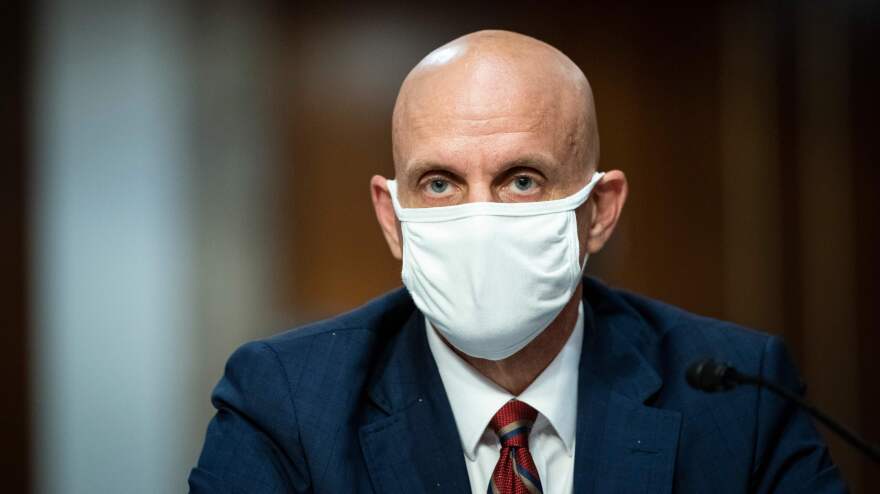The Food and Drug Administration has found that there are "no specific safety concerns" that would stop the agency from approving the COVID-19 vaccine made by Pfizer and BioNTech for emergency use.
Career scientists at the FDA analyzed the data from the ongoing Pfizer trial to form their own conclusions about its safety and efficacy.
Stephen Hahn, who heads the FDA, says the public analysis is a "very, very important part of our promise to the American people that we won't cut corners in how we assess the safety and effectiveness of a vaccine."
Polling from November shows about 40% of Americans are hesitant to take one.
The FDA's findings come in documents posted Tuesday. Independent experts are meeting Thursday to advise the FDA on whether to approve the vaccine, which the FDA's analysis says is 95% effective — affirming Pfizer's findings.
Hahn talked with NPR's All Things Considered about where the vaccine approval process goes from here. Here are excerpts:
How much time do you think it would take to make an assessment about emergency use authorization?
So this will then go to the vaccine advisory committee. And we're expecting a good discussion there of the data that we're presenting to them. And then we believe shortly after that meeting we'll be able to make a decision.
A lot of what this depends upon is what the discussion is like [with] these outside experts from the vaccine advisory committee. If they have substantial questions or additional analyses that they think are relevant to our decision-making, we will judge whether that's important to do. That may need to be done and that may contribute to some additional time needed. But again, I can't prejudge what that conversation is going to be like.
You have made adjustments to the review process to try to guarantee safety, but ultimately you only have a few months of data. Does that shortened timeline concern you in any way?
So two months' follow-up data was required from a safety perspective. Remember also that we have data from the phase 1 and phase 2 clinical trials that were performed in the spring and the summer that gives us additional information about the vaccine, particularly with respect to safety. But one of the reasons that we chose the two-month period was because our data and others' data in the literature suggests that that time period captures the overwhelming a number of side effects that might be seen.
But really important for the American public to know, regardless of the medical product, whether it's this vaccine or any other medical product, we will always have a monitoring that occurs after an authorization so that if there are additional data that come in that we need to know about, particularly around side effects but also efficacy, we can incorporate that into our decision-making.
How can you be sure that there are no long-term side effects from this vaccine with only several months of data?
So even if you look at other vaccine approvals, the normal approval process, we can, as with any medical product, never 100% predict long-term side effects. That's why we have a vigorous post-authorization process for assessing both safety and effectiveness.
So I want to be really clear with the American people. This is expedited. We're not cutting corners in terms of our assessment. But we know that the work isn't done. If there's an authorization that's upcoming, we have to continue to monitor and to have surveillance.
We also need to balance. This is an important balance. We know that people are dying of COVID-19 and that prevention of COVID-19, if the data support it, is likewise a very important measure that needs to be instituted and the vaccine can help us with that potentially if it's authorized.
Sam Gringlas and Courtney Dorning produced and edited the audio interview. James Doubek produced for the Web.
Copyright 2022 NPR. To see more, visit https://www.npr.org.



